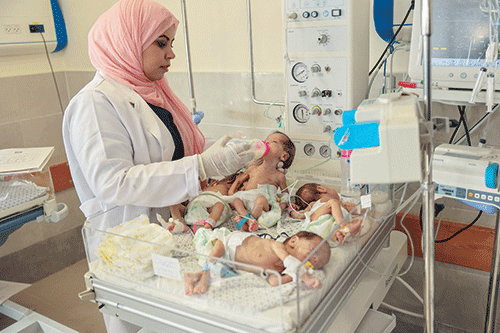< Paheja Siririka
The health ministry said between January and September 2023, the Windhoek Central Hospital’s Neonatal Unit admitted 620 preterm newborns, and 76 premature newborns did not survive, with preterm birth being the primary cause, alongside other contributing factors.
The ministry’s director of primary healthcare, Naemi Shoopala said this includes referrals from different parts of Namibia.
“In Namibia, 54% of newborn deaths are attributed to preterm birth and low birth weight, a number that remains unacceptably high,” she said.
Shoopala noted that over the years, Namibia has made progress, reducing its neonatal mortality rate from 32/1000 live births in 2000 to 24/1000 in 2006 and reaching the current figure of 20/1000 live births.
“We aim to further decrease this number. Those premature infant underdeveloped organs, such as the brain, lungs, heart, eyes, ears, and stomach, require dedicated care and support during the neonatal periods who do survive often but face a lifetime of disability or chronic illness,” stated Shoopala.
She said many of these children experience long-term and life-altering conditions, difficulties in school, and behaviour management challenges.
She added that preterm babies are prone to infections, chronic lung and heart issues, and may suffer from vision and hearing impairments. Therefore, they need support from schools, teachers, healthcare facilities, communities, parents, and the healthcare system as a whole to cope with the effects of premature birth.
“We encourage parents, including fathers, to engage in skin-to-skin contact, such as Kangaroo care, which has been shown to benefit both infants and parents,” said Shoopala.
She said this practice regulates the baby’s vital signs, supports growth and weight gain, reduces the risk of mortality, and improves the baby’s sleep patterns.
According to Shoopala, for parents, it enhances bonding, increases breast milk supply, and boosts their confidence in caring for their newborns.
Premature births disproportionately affect developing countries, particularly families in vulnerable situations.
“While we may not have all the answers, we call upon clinicians and academics to conduct research within the Namibian context on this important health issue,” said Shoopala.
The World Health Organisation stated that since prematurity is the leading cause of death in children’s early years, there is an urgent need to strengthen both care for preterm babies as well as prevention efforts, particularly maternal health and nutrition to improve childhood survival.
“Preterm babies are especially vulnerable to life-threatening health complications, and they need special care and attention,” said Dr Anshu Banerjee, Director of Maternal, Newborn, Child and Adolescent Health and Ageing at WHO.
Banerjee said maternal health risks, such as adolescent pregnancy, infections, poor nutrition, and pre-eclampsia, are closely linked to preterm births. Quality antenatal care is critical to detect and manage complications, ensure accurate pregnancy dating through early ultrasound scans, and if needed, delay labour through approved treatments, he said.
-psiririka@nepc.com.na


